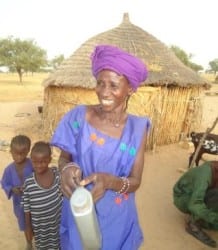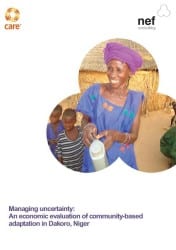
An economic evaluation of community-based adaptation in Dakoro, Niger
Download the report in English: An economic evaluation of community-based adaptation in Dakoro, Niger
Download the report in French: Investir dans l’incertitude_CARE_NEFC (French) Full Report Final
Summary of the report
Climate change adaptation is one of the top priorities for developing countries. In the face of climate change, development policy will need to embed adaptation in its core development strategies. One of the key approaches is community-based adaptation, thought to be highly effective for the following reasons:
- Through co-definition and co-design of adaptation strategies with communities there is increased uptake and viability of adaptation strategies because communities develop a strong sense of ownership.
- By enhancing communities’ awareness and understanding of climate change and uncertainty, communities are able to create responsive plans and make decisions with greater flexibility and relevance.
- By embedding new knowledge and understanding into community structures, the existing structures and institutional mechanisms are expanded and strengthened. In turn, this is a key driver for individuals to flexibly adapt to change and for collective structures to adjust to unexpected changes in an environment of uncertainty.
Our research aimed to test to what extent community-based adaptation is an efficient and effective strategy for building resilience and adaptive capacity.
We used an extended Social Cost-Benefit Analysis (SCBA) to compare and contrast the benefits and investment of CARE International’s Adaptation Learning Programme (ALP) in Dakoro, Niger.
Dakoro, Niger
Due to its geographical location and socio-economic characteristics, Niger is highly dependent on climate conditions and highly vulnerable to climate variability. Given that roughly 40% of its GDP is reliant on agricultural output and 80% of its population lives in rural areas, climate shocks or anomalies impact on its economy and the livelihoods of its population in a disproportional way. In addition, agricultural production does not keep up with population growth therefore putting an increasing number of households at risk of malnutrition. The climate data on Niger and the area of analysis, Dakoro, is inconclusive but, even if overall precipitations slightly increase or remain stable, all climate models suggest significant increases in mean temperatures. So, climate evolutions coupled with population growth are likely to exacerbate existing vulnerabilities.
Our research
To build a SCBA model we collected qualitative information and quantitative data directly from a sample of households in four communities. The data allowed us to measure the net, or additional, impact by taking into account both what would have happened in the absence of ALP and what proportion of the change observed could be attributable to other actors or programmes in the area.
The results
The results suggest that ALP’s investment in Dakoro has yielded high returns. It increased the economic capital of communities in terms of revenue and savings, as well as social and environmental capital. Social indicators include typical development outcomes such as health and education while environmental indicators encompass the impact of avoided deforestation, reforestation and avoided land degradation.
Even if we only take into account the benefits ALP has generated over four years, findings suggest that for every £1 invested in communities, there has been a return of more than £4. We extended the evaluative model to forecast capital evolutions to 2020 using three core climate scenarios to compare a no-intervention scenario to an intervention scenario. Even under a high discount rate, results remain positive and returns are high.
Our review of a variety of previous economic analyses of adaptation and Disaster Risk Reduction (DRR) interventions suggests that the returns on investment of ALP are comparatively high.
In conclusion…
Community-based adaptation can be a promising avenue for building cost-effective adaptation strategies to climate change.
The report
 Download the full report, in English, here: An economic evaluation of community-based adaptation in Dakoro, Niger
Download the full report, in English, here: An economic evaluation of community-based adaptation in Dakoro, Niger
Download the full report, in French, here: Investir dans l’incertitude_CARE_NEFC (French) Full Report Final
Guidelines and template
NEF Consulting has also produced a set of guidelines aimed at building the capacity of economists and planners to carry out cost benefit analysis, assess the effectiveness of different climate change adaptation and development interventions, and to budget for adaptation actions. Entitled Simplified guidelines for Social Cost-Benefit Analysis of Climate Change adaptation projects on a local scale, you can download it, in English here:
SCBA analysis of climate change adaptation projects
And in French, here:
ACA Guide Simplifie_FRENCH_FINAL
An excel spreadsheet template to carry out social cost benefit analysis is available to download here: Indicative Cost Benefit model for Methodology Guidance_NEF Consulting. This should be used in conjunction with the above reports.
Read more about ALP at https://www.careclimatechange.org/adaptation-initiatives/alp
